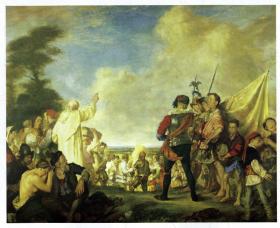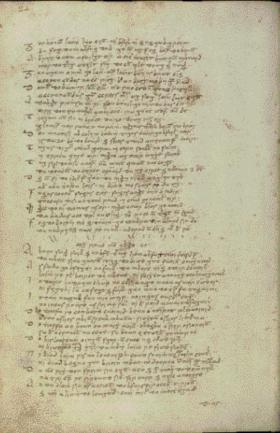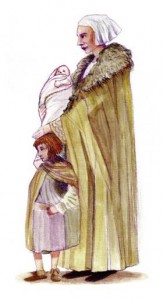Dispossession and reaction: the Gaelic literati and the Plantation of Ulster
Published in Early Modern History (1500–1700), Features, General, Issue 6 (Nov/Dec 2009), Plantation of Ireland, Volume 17
The Departure of O’Neill out of Ireland, by Thomas Ryan, RHA. Ulster, traditionally a bastion of Gaelic society and culture, was transformed by the military defeat and subsequent departure of the northern earls, Rory O’Donnell and Hugh O’Neill, to the Continent.
During the first decade of the seventeenth century, Ulster, traditionally a bastion of Gaelic society and culture, was transformed in a relatively short time by the military defeat and subsequent departure to the Continent of the northern earls, Rory O’Donnell and Hugh O’Neill. Moreover, the unsuccessful revolt in 1608 of Sir Cahir O’Doherty persuaded the London government to curtail drastically the autonomy of the remaining Gaelic lords in the province. The proposed new political and social settlement entailed wholesale confiscation of lands and the introduction of a large cohort of settlers from Britain. In effect, the process known as plantation aimed to create a cultural and social tabula rasa in a region that had been characterised by a long-established indigenous culture.
The response of the Gaelic intellectual élite to the plantation of Ulster is broadly defined by a powerful and pervasive sense of trauma, alienation and communal dispossession. In an anonymous poem in the Book of O’Conor Don (1631), which reflects bitterly on the exile of the northern earls from Ireland, many of the key themes and motifs that inform a bardic interpretative pattern of despondency, dislocation and personal agency are forcefully expressed. In this poem, beginning Mochean don loing si tar lear (‘Good luck to that ship’), the full impact and implications of a fundamental shift in the perception and exercise of authority and ethnic integrity are acutely and clinically delineated. While focusing on the immediate fate of O’Donnell and O’Neill, the author is unambiguous in his portrayal of a tragic but emblematic development that reverberates ominously across the island of Ireland. The departure of these advocates of Gaelic suzerainty signals the demise of collective autonomy. In fact, the literal and actual supremacy of the Gaoidhil accompanies the passengers of this vessel across the seas to the Continent, and collective disgrace has resulted. Ireland lies inanimate and passive, such is the debilitating nature of the disaster consequent on the exile of the earls and their kinsmen. Imploring protection from the Holy Trinity for the ship’s passengers, the poet also stresses the depth of his own distress. In effect, therefore, the impact of this transformation in Ireland was manifest on a variety of levels: national, provincial, dynastic, familial and personal.
‘Where have the Gaoidhil gone?’
These sentiments are echoed in another poem in the Book of O’Conor Don. Beginning Cáit ar ghabhadar Gaoidhil? (‘Where have the Gaoidhil gone?’), Lochlainn Ó Dálaigh laments a dramatic reversal of fortune for aristocratic Gaelic society. Traditional Gaelic haunts and pursuits are neglected following the dispersal and exile of the warrior élite from all parts of Ireland. The place of the Gaelic nobility has been usurped by arrogant arriviste interlopers of base origin from England and Scotland. These newcomers now divide the island among themselves and denominate their holdings in ‘acres’. Ireland resembles a chessboard robbed of its authentic chessmen that have been replaced by upstarts. Change for the worse has occurred. Places of worship have been occupied by intruders, religious services conducted in the open, clergymen’s vestments used as bedding for cattle. Fairs have taken the place of hunts, agricultural cultivation has displaced horse racing, and former aristocratic residences have been replaced by new homesteads. Nobody among the Gaelic Irish has cause for joy. Ominously, the cultural rituals of high Gaelic civility have also been submerged. Praise poetry, harp and organ music, dynastic tales and genealogical scholarship no longer appeal to the Gaoidhil, such is the severity of the oppression that they endure. The banishment of the Gaelic Irish is not, however, ascribed to foreign military superiority but to divine wrath. Historically, the transgressions of other peoples, such as the ‘sons of Israel’ and the ‘great race of Maccabaeus’, also incurred divine punishment. Each of these peoples had secured forgiveness through condign repentance. The poet laments the failure of his own people to atone for their sinful misdeeds. Atonement promised deliverance but, in the meantime, divine retribution had enabled the ‘men of Scotland’ and the ‘youths of London’ to supplant the Gaelic Irish.
Gaelic Irish compared to the ancient Greeks

Above: In the poem beginning A bhean fuair faill ar an bhfeart (‘My lady who has found the tomb unattended’), Eoghan Ruadh Mac an Bhaird addresses Nuala O’Donnell below, as imagined by artist John Conway), wife of Niall Garbh O’Donnell (d. 1625) and sister of Aodh Ruadh (d. 1602), who is presented as a solitary mourner at the tomb of her brothers and nephew in Rome. (RIA/Irish Script on Screen)
Eochaidh Ó hEódhusa addressed the poem beginning Beag mhaireas do mhacraidh Ghaoidheal (‘Few remain of the Gaelic youth’) to Brian MacMahon of Oriel. It is indelibly marked by a deep vein of political pessimism. The Irish are in a state of pronounced despondency, their everyday existence resembles a living death, and nothing within the author’s purview provides a reason for joy. Indeed, today all have their appointed time for mourning. Overcome by a destructive wave, the Gaelic warrior band is inert. Hearts burdened by enveloping weariness, it is clear that the men of the Greek-like Gaelic Irish are deeply dispirited. The comparison of the Irish to the ancient Greeks appears to infer a historical analogy for the present demise of a once-vibrant culture. Indeed, the distressed state of the Gaoidhil is instructive in its sermon-like nature, and the juxtaposition of references to the pagan ancient world and the quintessentially Christian medium of the sermon is disconcerting and suggestive of contemporary turmoil. The period of prosperity allocated to the nobles of Ireland has been spent, and once again the notion of a catastrophic wave is invoked to emphasise transformation and profound dislocation. Gaelic noblemen are in a state of acquiescence. Ó hEódhusa describes how the warrior élite had abandoned their martial discipline and routine. Indeed, their previous belligerence currently strikes him as having been possibly imaginary. The passivity of the Gaoidhil is not merely evidenced by their lack of martial vigour; it is also apparent in their neglect of traditional pursuits such as hunting, athletics and horsemanship. Then, rather startlingly, given the bleak despondence and apparent fatalism of the preceding quatrains, Ó hEódhusa declares that there yet remains an unextinguished spark among the Gaelic Irish that will revive their spirits. The insistent emphasis on the passivity of the Gaelic nobility is remarkable, and their indifference to martial endeavour implies a process of demasculinisation. Moreover, the poet also seems to suggest that the emollient quality of the majority will be redeemed by the regenerative intervention of a resurgent minority.
The loneliness of Nuala O’Donnell
In the poem beginning A bhean fuair faill ar an bhfeart (‘My lady who has found the tomb unattended’), Eoghan Ruadh Mac an Bhaird addresses Nuala O’Donnell, wife of Niall Garbh O’Donnell (d. 1625) and sister of Aodh Ruadh (d. 1602), who is presented as a solitary mourner at the tomb of her brothers and nephew in Rome: Rory O’Donnell (d. 1608), Cathbharr O’Donnell (d. 1608) and Aodh Óg O’Neill (d. 1609). The first eight quatrains of the composition centre on the poet’s graphic delineation of the loneliness of Nuala’s vigil in Rome in contrast to what surely would have been a communal process of grieving and mourning had this tragic scenario unfolded in Ireland. In fact, in the opening quatrain Mac an Bhaird suggests that even in Rome Nuala would not have faced such daunting tribulations unsupported had Gaelic warriors been present. Had the deaths occurred in Derry, Drumcliff or Armagh, the poet asserts that keening women would have arrived from across Ireland to assist Nuala, while no house would have remained untouched by lamentation. In Ireland their tomb would have been surrounded by mourners, deeply affected by grief and sadness. Returning to Nuala’s present vigil, he depicts her as lying prostrate beside the three bodies, whose untimely demise is described as the ‘true culmination of our woe’. The poet then proceeds to review the lineage and conventional qualities of each of the deceased. He argues that had they fallen in Ireland their virtues would have occasioned both lamentation and joy—the unexpected latter reaction presumably prompted by their heroism and exemplary demeanour.
Mac an Bhaird reflects on the potential impact of their deaths had they been killed in any of the successful Gaelic military actions undertaken against the Crown during the course of Hugh O’Neill’s rebellion (1593–1603). Immediately he asserts that it would have constituted a cause of distress for all of Ulster. In sum, their passing has proved a source of torment for the north of Ireland. In particular, Rory’s passing presages disaster for Ireland. Directly addressing Nuala, the poet asks who of the Gaelic Irish would not weep with her for the loss of the flower of the Gaoidhil, and he urges her to transcend her sorrow, as she will join her kinsmen in due course. God’s will is manifest and Nuala is urged to accept the outcome. Turning from Nuala to the Almighty, Mac an Bhaird implores Him to relieve the suffering of ‘the survivors from war of Conall’s blood’ and to alleviate the destruction or ‘shipwreck’ (longbhriseadh) that has overtaken them. Addressing the Virgin Mary, who was traditionally perceived in medieval Christianity as a mediator between the human and the divine, Mac an Bhaird continues the theme of maritime disaster, which possibly also alludes to the ship that carried the northern earls into exile. He begs her to subdue the waves that engulf them and to rescue the ship of their children. This latter reference seems to suggest that the fate of the next generation of the Gaoidhil, or perhaps more narrowly of the O’Donnells, hangs precariously in the balance. Jesus is beseeched to intervene on their behalf.
The poet states simply and effectively that he, like Nuala, had hoped that the Gaelic Irish might have been liberated in due course when the deceased men had first left Ireland. As in the case of Eochaidh Ó hEódhusa, Mac an Bhaird chronicles the impact of a devastating blow to aristocratic Gaelic society. But the poet is not acquiescent in the face of death and dislocation. In the final eight quatrains of the poem, Mac an Bhaird not only urges Nuala to move beyond a sense of fatalistic bereavement by appeasing divine wrath but also sketches a scenario that posits intervention by God, Jesus and Mary by way of alleviation of the plight of the Gaoidhil. In lamenting Gaelic misfortunes, Mac an Bhaird, critically, also broaches the possibility of communal redemption.
Conclusion
 The work of praise poets reveals a record of cogent if despondent appraisal of the outcome of political, social, religious, economic, cultural and demographic change in Ulster during the first two decades of the seventeenth century. Poets were cognisant of the implications for élite Gaelic culture of the collapse of aristocratic Gaelic society and leadership. A range of emotions recur in these poems: anger, bitterness, sadness, resilience and occasionally optimism. At a personal level, poets manifested a high degree of autonomy and responded to crisis in a manner that exploited available opportunities. They were far from uncomprehending of the turbulent transformation in which they participated. HI
The work of praise poets reveals a record of cogent if despondent appraisal of the outcome of political, social, religious, economic, cultural and demographic change in Ulster during the first two decades of the seventeenth century. Poets were cognisant of the implications for élite Gaelic culture of the collapse of aristocratic Gaelic society and leadership. A range of emotions recur in these poems: anger, bitterness, sadness, resilience and occasionally optimism. At a personal level, poets manifested a high degree of autonomy and responded to crisis in a manner that exploited available opportunities. They were far from uncomprehending of the turbulent transformation in which they participated. HI
Marc Caball is director of the UCD Humanities Institute of Ireland and the UCD Graduate School in Arts and Celtic Studies.
Further reading:
M. Caball, Poets & politics: reaction and continuity in Irish poetry, 1558–1625 (Cork, 1998).
W. Gillies (ed.), ‘A poem on the downfall of the Gaoidhil’, Éigse 13 (1969–70), 203–10.
E. Knott (ed.), ‘Mac an Bhaird’s elegy on the Ulster lords’, Celtica 5 (1960), 161–71.
C. Ní Dhomhnaill (ed.), Duanaireacht (Dublin, 1975).
















